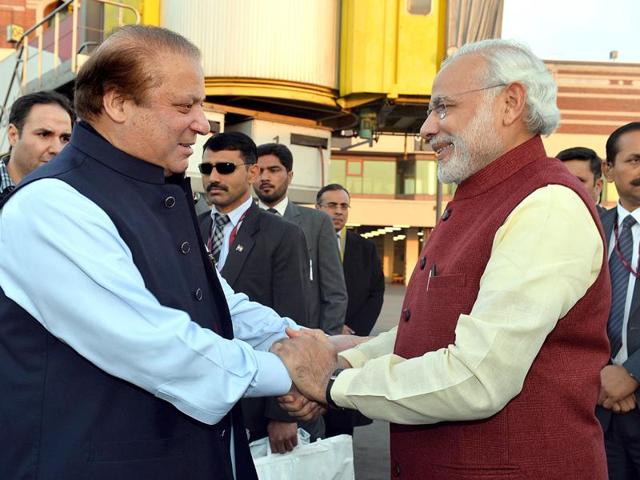After Modi-Sharif bonhomie, Pathankot poses challenge to Pak policy
Even before the gunfire had died down at the Pathankot airbase, people across India had begun asking the inevitable question: Would this brazen terror attack neutralise the bonhomie and gains generated by Prime Minister Narendra Modi’s surprise visit to Lahore?
Even before the gunfire had died down at the Pathankot airbase, people across India had begun asking the inevitable question: Would this brazen terror attack neutralise the bonhomie and gains generated by Prime Minister Narendra Modi’s surprise visit to Lahore?

The question was not surprising, given the cycle that has accompanied almost every recent effort by Indian and Pakistani leaders to engage and move ahead with the fraught peace process – a grand gesture or a visit or some forward movement, and an outrageous terror attack meant to inflame and incite public opinion.
Several events that preceded the attack on the Indian Air Force base in Pathankot are definitely a cause for concern – the July 2015 attack on a bus and a police station in Gurdaspur district by terrorists disguised as soldiers, the ambush of a BSF convoy in Udhampur that resulted in the capture of a Pakistani member of the Lashkar-e-Taiba and evidence gathered by Indian intelligence agencies from the GPS devices used in both attacks.
With these previous attacks pointing to the involvement of Pakistan’s shadowy intelligence set-up and numerous reports about intelligence agencies from across the western border trying to foment unrest in India’s Punjab state, the questions about Pakistani involvement in Saturday’s attack were inevitable.
The latest attack will definitely increase pressure on Prime Minister Modi, especially from those who criticised his sudden decision to visit Lahore on December 25 to greet his Pakistani counterpart Nawaz Sharif on his birthday after saying for months that talks and terrorism could not go together.
Read: Modi’s Pak visit huge gamble, but worth the risk if it ends in peace
For those who adore Modi for his tough talk on terrorism and Pakistan, a failure to act in the current circumstances will be perceived as a sign of weakness. But any rash action by India will be accompanied by the risk of scuppering all that was gained for the peace process by Modi’s Lahore visit after years of stagnation.
“The attack in Pathkankot was along predictable lines, particularly after the Lahore visit,” C Uday Bhaskar, director of the Society for Policy Studies, told Hindustan Times.
“The challenge is to ensure that the bilateral relationship is insulated from such threats.”
That, experts say, is easier said than done, especially because of the Pakistani military establishment’s continuing support to groups such as the Lashkar-e-Taiba that have the wherewithal to carry out brazen attacks like the one at Pathankot.
Read: Parrikar to hold high-level meeting with security officials following Pathankot attack
Elements within Pakistan’s military and intelligence establishment still perceive the LeT and Jaish-e-Mohammed – blamed by some for the attack in Pathankot – as “assets” despite the National Action Plan (NAP) framed by Nawaz Sharif’s government to tackle terrorism after a Taliban attack on a school in Peshawar in December 2014.
Watch: IAF Choppers in action as Pathankot Air Force base attacked
Experts have pointed out that the Pakistan Army, while implementing the NAP, has focussed on groups involved in domestic terrorism while turning a blind eye to groups that are active in India or Afghanistan. Nawaz Sharif’s government has also been reluctant to act against organisations such as LeT and JeM as their strongholds are in Punjab, the main base of Sharif’s PML-N party. Any move against these groups could be followed by bloodshed in Punjab, which has witnessed fewer terror attacks than other parts of Pakistan.
Read| Don’t expect much from Indo-Pak talks in January: Sartaj Aziz
Ershad Mahmud, a leading Islamabad-based columnist of Kashmiri origin, said there is “no space to support” attacks such as the one in Pathankot or “such acts in Pakistan or its neighbourhood” after the rolling out of the NAP by Nawaz Sharif’s government.
“No one can support such acts of terror,” he said, adding both sides would stand to lose a lot if they allowed such events to derail their fragile peace process.
“Such attacks are expected from certain elements but the political leadership now has to show the courage not to fall in their trap. The goodwill created for the peace process by Modi’s visit should not be squandered. If fact, the visit strengthened Nawaz Sharif within Pakistani politics and among state institutions,” Mahmud said.
“This spirit must be kept alive.”
(The views expressed by the writer are personal. He tweets as @rezhasan)





